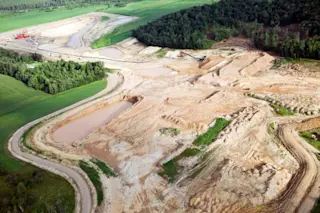The drilling technique known as hydraulic fracturing, or fracking, came under renewed fire this past year. Fracking makes it possible to tap into vast domestic reserves of low-carbon natural gas, but the process—which uses sand, chemicals, and millions of gallons of water to free gas trapped inside dense rock—has sparked environmental questions. New evidence bolsters those concerns.
Drinking water samples from 68 wells in Pennsylvania and New York (in the Marcellus and Utica shale areas) were contaminated with excess methane, according to a report published last May in the Proceedings of the National Academy of Sciences. The study, led by environmental chemist Robert Jackson of Duke University, was the first to find a conclusive link between fracking and groundwater pollution. The closer the wells were to the drill sites, the higher the methane concentrations, some of which were above the level that raises alarm at the Department of the Interior. ...















